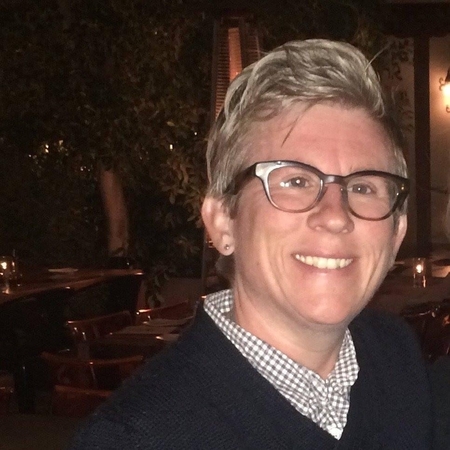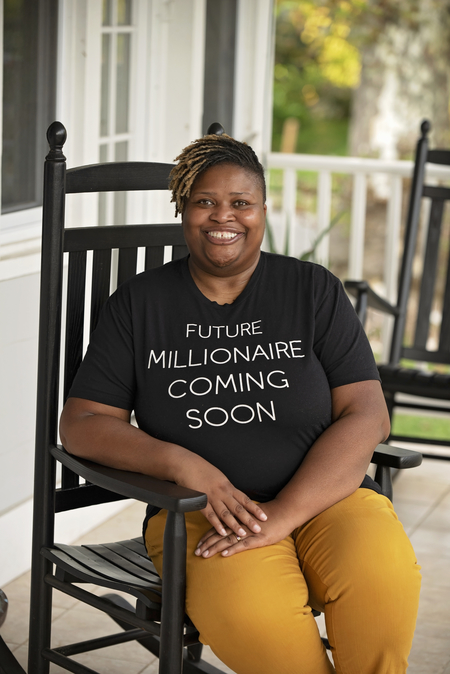Happy Pride, Elphas! 🏳️🌈 🏳️⚧️
We all want to be able to show up to work as our whole selves feeling safe, secure, and comfortable in doing so – to live our truth without fearing judgment or rejection from our peers.
So, what does it mean to create a truly inclusive environment at work?
This Pride Month, we asked the LGBTQIA+ community at Elpha what inclusion in the workplace looks like to them, what makes them most proud, and when they feel their most authentic selves at work.
These Elpha members are not only out, proud, and making waves in their communities, but in sharing their stories, they are also creating safe spaces for others to live their truths. ✨
Elizabeth Haste, Technical Project Manager

Elizabeth Haste is a Technical Project Manager and Requirements Architect. As a self-described queer leader, she’s directed many LGBTQIA+ employee resource groups for mid-sized companies.
What signs does Elizabeth look for in employers to determine if it’s an LGBTQIA+ -friendly workplace?
The first thing I look at is the makeup of their leadership. Queerness is invisible, but oppression is intersectional; if the executive team is already averse to sharing power in regards to race or gender, it’s safe to assume they’re going to have DEI issues with the LGBTQIA+ community, too.
When doing research, I am skeptical of formal diversity awards, since they’re often paid, shallow evaluations. Companies sometimes pressure employees for positive Glassdoor reviews or survey responses, so I ignore those, too. Instead, I search for specific feedback on how members of marginalized communities felt they were treated. I look up who or what the company has donated to, and the kinds of clients they accept. Fox News? Hard pass.
Not every queer person will have the luxury of risking this, but I also like to ask direct questions about inclusion during interviews. Things like, do you work with any trans colleagues? Do you have employee resource groups? Does your insurance have exclusions for queer healthcare? What specific actions has the company taken to support the community in the last 6 months? Are they caught off guard when you ask for their pronouns?
If you sense discomfort or vagueness, dig in.
How can workplaces go the extra mile to support people who are transitioning?
Each person’s transition journey is unique, so the most important thing you can do is ask what they need, without making assumptions. Do they want their teammates to use a new name? If so, when? Would they like to share themselves, or delegate to a supervisor? What accommodations would be affirming for them?
It’s critical that the trans employee feels in complete control of every step. If you need training, the Transgender Law Center has an excellent sample transition policy here you can use to kick-start this needs-and-boundaries conversation.
Then, check in with them sometimes. Trans people are more visible than we’ve ever been, which is excellent, but it means we’re in increased danger, too. Today’s media and political landscapes are overflowing with a frankly unprecedented amount of targeted, anti-transgender hate. That backlash takes a mental toll. Be generous with your PTO.
Finally, if your trans peers express discomfort about a situation, believe them. Be curious. Don’t deflect or dismiss by saying, “I’m sure they didn’t mean it that way”. Positive intent does not nullify inflicted harm. We already spend so much of our energy convincing our doctors and governments to take us seriously. Let work be a safe space. 💙
H Schuster, Founder & CEO of HUSSLUP

H Schuster is the founder and CEO of HUSSLUP , a company that connects diverse creative talent with the media and entertainment companies that need them in order to democratize access to Hollywood.
She has found great success as a producer, executive, and entrepreneur in the entertainment industry and has extensive C-suite level experience in strategic planning, scaling businesses, content development, and content production.
What does inclusive leadership look like to H?
Let me just say, for diverse talent, the burden of representing our entire community—and continuing to be true to ourselves when feeling totally isolated—can be difficult and tiring. To avoid this burden, some diverse employees will “cover” in various ways— changing their appearance or mannerisms, avoiding affiliations and/or advocating for issues. And as a result, even if you successfully recruit someone, you can’t retain them due to culture issues. Whether a company’s leadership is diverse or not, the key question is: How do leaders stop the expensive, morale-killing revolving door that this burden on diverse talent can cause? I believe all leaders need to embrace and encourage four key tactics to create a truly inclusive environment:
1. Active listening: seek out and listen to what your employees are actually saying; don’t assume and don’t avoid.
2. Safe spaces: create affinity groups and employee resource groups of all kinds and encourage everyone to join at least one to destigmatize them.
3. Clear and safe reporting procedures: do not have employee feedback sessions with a direct report (they may feel watched or that it will impact their review).
4. Encourage everyone to confront stereotypes and lead with empathy: use authentic storytelling rather than labels to create allyship and understanding. ✨
What is H’s proudest accomplishment?
Professionally, I am proud of launching Detour, a location-aware podcasting app that was one of Apple’s top 10 apps of 2016.
As CCO, I built a global team of over 60 producers, produced over 150 hours of premium audio content around the world, and launched “Detour Everywhere” in 10 months. We closed deals with Airbnb (we were a partner for their Experiences launch) and Nike to make content for them as a customer acquisition strategy. We did all of this while I worked closely with our engineering team, who were still building the underlying engine that powered the content. It was fast-paced, exciting, and incredibly rewarding. We were ahead of the podcasting curve and I had the opportunity to write the playbook on how to make location-aware content that used the GPS on your phone to take you on an immersive audio experience.
I had the opportunity to travel the globe searching out unknown stories told by authentic local voices and our customers really enjoyed the window into other people’s lives and experiences. After having worked at larger media companies for much of my career, this experience clarified for me that 1. I wanted to be a founder/entrepreneur and 2. I wanted to build a company that I believed could help change an aspect of the world for the better.
Charlotte Fountaine, Co-founder of Kalda

Charlotte Fountaine is the co-founder Kalda , the world’s first LGBTQIA+ mental wellbeing app. The platform provides gender and sexuality affirming support.
As a bisexual person, Charlotte explains the double discrimination they can face: in the heterosexual community, they can be invisible or eroticized, while in the queer community, they can be assumed to be indecisive or confused. That being said, she’s grateful for the positivity and support she received on her journey, which is why she wants to do the same for others through Kalda.
What is Charlotte proudest of?
Seeing Kalda improve people’s mental health. Our small early trial showed a clinically significant decrease in depression and a decrease in anxiety. Running Kalda has given me a chance to provide mental health support in the queer community, and meet a lot of awesome people in the process. 💫
What is inclusive leadership about, according to Charlotte?
Inclusive leadership is about being consistent and accountable to your teammates. It’s about setting clear boundaries and expectations and respecting other people’s too. It’s also about more concrete actions: accessible hiring, taking a healthy amount of time off and making spaces where people can talk about their feelings.
At Kalda we also work to make sure our services are inclusive: providing mental health support remotely and with subtitles means people can access it all over the world, with a variety of abilities and access needs.
Femily Howe, Gender/Inclusion Advisor at The Corporate Inclusion Group

Femily Howe is Silicon Valley's Gender/Equity Advisor. They help tech companies with advancing women, LGBTQIA+ inclusion and intersectional allyship.
What does inclusive leadership mean to Femily?
Making sure the most marginalized folks in the room get the spotlight, get equal access to juicy opportunities, + get respected + paid.
Inclusive leadership means always learning what the latest issues are in terms of power, privilege, and equity. And using data to ensure you know exactly how your company is doing - not just your “gut feeling.”
It means mostly listening to Thought leaders of Color and women + queers in your field (we’ve all been over-fed content by straight white guys in our fields, so it’s an effort to balance).
It’s saying “I’d love to speak at your conference, please confirm for me that there is race/gender equity in speaker pay + representation of speakers. And that there will be other queer/trans/etc… folks speaking too.”
Inclusive leadership means working 90% behind the scenes to change things systemically in your company for every 10% that you post about. Inclusive leadership isn’t that fluff - it’s changing the fabric of a company so that even if all the advocates left the company, the policies/culture/accountability structures would remain strong.
When does Femily feel their most authentic self at work?
When there are other out queers of all colors also rocking their queer styles + queer personalities. This allows me to shine. It’s not always possible, due to anti-queer bias, especially in the workplace.
One thing that surprises straight Allies is that nearly half of queer people aren’t out at work. Yikes! I always tell my tech companies “if you don’t have 10% of your employees showing up wildly queerly, you’re either over-recruiting straights (at the cost of you hiring queer talent) or your corporate culture is suppressing your queer employees' self-expression. Straight millennials are even saying they don’t want to work in cookie-cutter puritan cultures where LBGTQIA+ employees aren’t “out”.
👉 Check out Femily’s Spotlight on Elpha about LGBTQIA+ inclusion in the pandemic workplace .
Grace Stephenson, Former Founder of Glimmer

Grace Stephenson is the former founder of an LGBTQIA+ and womxn-centered digital health start-up called Glimmer . She is passionate about innovation, product management and development, and mission-centered start-ups.
What is Grace’s proudest accomplishment?
My proudest accomplishment has been the ability to build a life for myself where I feel comfortable, safe, and have the flexibility for creativity and growth on a daily basis. I’m proud that I have been able to give myself opportunities past survival and safety — and can focus on future growth and flourishing in my environment.
My start-up, Glimmer, has allowed me to not only create opportunity for myself but for others — helping those in the LGBTQIA+ community struggling with mental health — and I’m abundantly grateful to be in the position to do so.
How does Grace define inclusive leadership?
To me, inclusive leadership is actively empowering and amplifying the voices of our communities. An inclusive leader should not only make sure folks from all backgrounds and identities are “included" but also affirmed, listened to, and lifted up in their environment. On a daily basis, this looks like seeing past personal bias and focusing on empathy, listening, and learning.
Ruby “Sunshine” Taylor, Founder and CEO of Financial Joy School

Ruby “Sunshine” Taylor is the founder and CEO of Financial Joy School , an edtech platform that provides Black youth and families with the tools and resources to build generational wealth through long-term investing.
For over 20 years, Ruby has enjoyed a career as a social worker, self-esteem expert, educator, motivational speaker, and author. During her healing process after a traumatic brain injury, she discovered the power of resilience which has brought her to where she is today.
What does inclusive leadership look like to Ruby?
Inclusive leadership looks like a diverse workforce – on all levels, from the boardroom to the entry-level level. When all are accepted and needed in a work environment, the welcoming climate will not only have a diverse workforce but keep a diverse workforce.
What makes Ruby proud?
I fell in love with a friend, and this friend was a woman. It blew my mind. While I had always suspected who I was, I was in denial. I denied myself because I feared rejection— dogma, family, friends, and society. Afraid of being who God created me to be.
I was afraid until the age of thirty-nine. Though I dated men and enjoyed it, I've found satisfaction with women on a much deeper level. It is a spiritual and emotional connection that leads me to greater love.
Approaching forty, I began to stop worrying about others and lived my life. But before I could get to the place called freedom, I had to go through many trials and tribulations. The journey to accepting my right to love and be loved intimately began on February 14, 2017, when God inspired me to start taking photographs of the sun. I took the first photo from my condo, looking out the window at the sun, the trees, and a church. That entire year, I snapped sun photos through my travels—from Lancaster to Honduras, the Bronx to Belize to New Orleans, Richmond, Roanoke, and Baltimore. ☀️
Throughout this fantastic year of travel and exploration, every photo helped to defrost the secrets I kept, the trauma from my childhood, the distorted view I had of God, and my inability to be in genuine intimate relationships. Each photo allowed God to defrost my fears and heal every wound.
Don't hide an inch of who God made you; let it shine; our dark world needs your light more than ever before. Every part of you is connected to the dreams you never dreamt. I will never forsake you—I love you because I created you.
Abby Sugar, CEO at Play Out Apparel

Abby Sugar is the Founder and CEO of Play Out Apparel , a Gender-Equal omnichannel underwear and athleisure brand, with a social good donation promise of 20% net profits to LGBTQ+ and BLM organizations.
What is Abby’s proudest accomplishment?
Not giving up on my dream of founding my startup, Play Out Apparel, when my original business partner and I went our separate ways. I had a lot of insecurity - Who am I? Why do I think I can do this? Am I qualified? - but ultimately, I did a lot of work on myself, my self-esteem, and relied on my family and friends who believed in me.
I read A LOT about leadership, business, communication, listening, and sought out business advisors, friends, and mentors; ultimately deciding to attend a startup accelerator.
Now, I have been profiled in the NYTimes and Forbes; named to the Forbes Next 1000 List; and speak on podcasts, international panels, and interviews as an expert on startups, fashion, diversity and inclusion, and topics important to LGBTQ+ individuals. You are capable of more than you think, and my personal motto is: f*cking figure it out!
What does inclusive leadership look like to Abby?
Inclusive leadership prioritizes listening and nonviolent communication; understanding that each individual is going to bring their own experiences and perspective to every situation, good and bad. It’s this multiplicity of ideas and voices that elevate the whole team, especially having other people who think differently than I do.
I know that I am succeeding at being a strong leader when my team feels equally comfortable coming to me to celebrate their wins as they do coming to me with problems or suggestions to uncomfortable situations/topics. I want each person to feel safe expressing their knowledge to be able to contribute fully to the bigger vision, mission, or task at hand that we are trying to accomplish.
We hope these stories and insights inspire you to be your truest self and to continue creating safe and inclusive spaces at work for everyone. ✊
Resources Mentioned
Femily Howe's Elpha Spotlight , LGBTQIA+ inclusion in the pandemic workplace.
Financial Joy School , an edtech platform that provides Black youth and families with the tools and resources to build generational wealth through long-term investing.
Glimmer , a digital wellness platform for LGBTQIA+ folks.
HUSSLUP , a company that connects diverse creative talent with the media and entertainment companies that need them in order to democratize access to Hollywood.
Kalda , the world’s first LGBTQIA+ mental wellbeing app.
Play Out Apparel , a Gender-Equal omnichannel underwear and athleisure brand, with a social good donation promise of 20% net profits to LGBTQ+ and BLM organizations.
Transgender Law Center's sample transition policy , helps your company welcome and include transgender, gender non-conforming, and transitioning employees.






